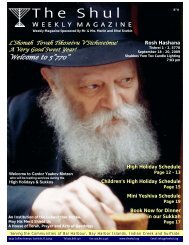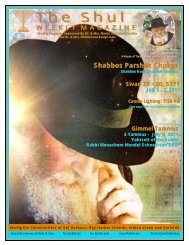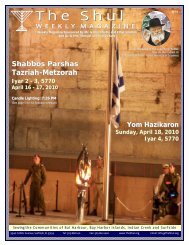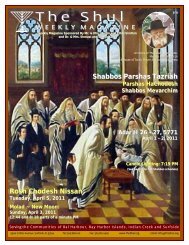Create successful ePaper yourself
Turn your PDF publications into a flip-book with our unique Google optimized e-Paper software.
Inspiration, Insights & Ideas<br />
Bringing Torah lessons to LIFE!<br />
intelligent creator and an infinity of self-creating universes, the<br />
former wins hands down.<br />
But let us hail a scientific genius. Professor Hawking is one of the<br />
truly great minds of our time. Two thousand years ago the rabbis<br />
coined a blessing – you can find it in any Jewish<br />
prayer book – on seeing a great scientist, regardless of his or her<br />
religious beliefs. That seems to me the right attitude of religion to<br />
science: admiration and thankfulness.<br />
But there is more to wisdom than science. It cannot tell us why we<br />
are here or how we should live. Science masquerading as religion is<br />
as unseemly as religion masquerading as science.<br />
<br />
<br />
Rabbi Levi Yitzchak Schneerson<br />
(1878-1944)<br />
Lubavitcher Rebbe's father<br />
R<br />
abbi Levi Yitzchak Schneerson was born<br />
on the 18th of Nissan in the town of<br />
Podrovnah (near Gomel) to his parents,<br />
Rabbi Baruch Schneur and Rebbetzin Zelda<br />
Rachel Schneerson. His great-great grandfather<br />
was the 3rd Chabad Rebbe, Rabbi Menachem<br />
Mendel of Lubavitch.<br />
In 1900, Rabbi Levi Yitzchak married Rebbetzin<br />
Chana Yanovski, whose father, Rabbi Meir<br />
Shlomo, was the rabbi of the Russian city of<br />
Nikolaiyev. In 1902, their eldest son, Menachem Mendel, later to be<br />
known as The Lubavitcher Rebbe, was born.<br />
Rabbi Levi Yitzchak lived in Nokolaiyev until 1909, when he was<br />
appointed to serve as the Rabbi of Yekatrinoslav (today,<br />
Dnepropetrovsk). In 1939 he was arrested by the communist regime<br />
for his fearless stance against the Party's efforts to eradicate Jewish<br />
learning and practice in the Soviet Union. After more than a year of<br />
torture and interrogations in Stalin's notorious prisons, he was<br />
sentenced to exile to the interior of Russia, where he died in 1944.<br />
<br />
Unwavering Jewish Courage<br />
T he<br />
Rebbe’s father, Rabbi Levi Yitzchak Schneerson, was the<br />
Chief Rabbi of Dnepropetrovsk, Ukraine, at a time when Jewish<br />
leaders were persecuted for preserving Judaism. Rabbi Levi<br />
Yitzchak, however, was defiant; publicly declaring that he would not<br />
be coerced into submission. More<br />
To ensure the production of Kosher for Passover Matzah, Rabbi Levi<br />
Yitzchak traveled to Moscow and met with the President of the<br />
USSR. He was appointed rabbinical supervisor over the central<br />
wheat mills of the entire country, and was granted authority to<br />
approve or reject any shipments he saw fit, no questions asked.<br />
Although his unflinching stands were a great risk to himself and his<br />
family, Rabbi Levi Yitzchak, encouraged by his wife, Rebbetzin<br />
Chana, remained resolute in the face of danger.<br />
<br />
13<br />
Halacha Of The Week<br />
By: Rabbi Dov Schochet<br />
Laws of Prayer<br />
T he<br />
Torah tells us “You shall fear your G-d<br />
and you shall serve Him”. Maimonides<br />
explains that although the charge to<br />
serve G-d is a general exhortation to follow<br />
the precepts of the Torah, it is also<br />
understood as referring specifically to the<br />
service of G-d through prayer. The Chinuch<br />
explains that as all good and blessings a person receives are a result<br />
of behavior, G-d who desires our success gave us many opportunities<br />
through the commandments to achieve this. He also gave us this<br />
course of prayer, where we can make a request for whatever we need,<br />
and the omnipotent G-d answers those who call to him in truth.<br />
While there is a dispute if the Biblical commandment is to pray daily<br />
or only when one is in distress, today one is obligated to pray three<br />
times every day; morning afternoon and night. (This corresponds to<br />
the Temple service, the daily morning and afternoon offerings and the<br />
nighttime service of burning the limbs of the sacrifices. The text of<br />
the 18 benedictions were established by Ezra the scribe and his court.<br />
The 19th was added later by the sage Samuel, with the approbation of<br />
the court of Rabbi Gamliel when the Jewish people were in great<br />
distress from the heretics and informants. The order of the prayer is 3<br />
blessings praising G-d, 13 asking for everything we need and the final 3<br />
are giving thanks for all of G-d’s kindness to us.<br />
The time for the Morning Prayer is from sunrise until 1/3 of the day<br />
has passed (measuring from sunrise to sunset). In times of need one<br />
can begin praying at daybreak. If one did not pray by then they can<br />
still pray until midday.<br />
One should pray in a closed area, unless they are traveling and the<br />
only available area is an open field. This is because being in a closed<br />
area puts the person in the proper frame of mind to pray. If possible,<br />
one should pray in a room with windows, so if they are lacking in<br />
intention they can look to the heavens and regain it. One should not<br />
pray in front of a painting as it can disrupt their concentration. One<br />
should also not pray in front of a mirror.<br />
One should face Israel and Jerusalem while praying. If one started<br />
praying and realized that they’re facing the wrong direction they<br />
should turn their head towards Jerusalem, if they are in the opposite<br />
direction then they should just continue praying. If this happened<br />
while praying with a Minyan then one should turn to face the same<br />
direction as the Minyan.<br />
One should not hold anything that they’re concerned shouldn’t fall<br />
during the Amidah. The exception is something used to aid in prayer;<br />
therefore one can hold a siddur (or a phone with the prayers on it). If a<br />
holy book is lying on the floor and disrupting one’s concentration,<br />
they may bend down and pick it up during the Amidah.<br />
One must concentrate on the words of the prayer and their meanings.<br />
One should purge any disturbing thoughts until they are focused fully<br />
on the prayer, recognizing that they would do so for a king of flesh<br />
and blood and how much more so for G-d.<br />
While the prayer should be recited silently, it is insufficient to think<br />
the words, rather one must utter them softly.<br />
Prayer is a testament of our faith in Hashem. If we turn to prayer in<br />
our times of difficulty and need, then we are making a clear<br />
statement that G-d runs the world. And clearly indicating that we’re<br />
cognizant that all blessing we receive are a direct result of Hashems’<br />
beneficence.














